The 5 Greatest Things Ever Accomplished While High
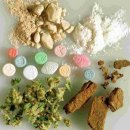
Cracked.com's new book is now on sale. What follows is one of the classic articles that appear in the book, along with 18 new articles that you can't read anywhere else.
Any dreadlocked white guys finding this article after Googling "Drugs Rule" should know that we've given this list about drugs a rule. To make the cut, an accomplishment has to be considered great by people who could pass a field sobriety test. So no Grateful Dead music. We're sure someone somewhere has enjoyed the Dead perfectly sober, just as there are probably non-Christians who listen to Christian Rock. But we're just as sure that in the grand scheme of things, those people don't count.
In fact, because we're masochists, we gave ourselves a strict no music policy, leaving us with ... well, not a whole lot actually. Turns out most great things were accomplished by people who just said no, at least immediately prior to accomplishing them. Except for these five.
Francis Crick Discovers DNA Thanks to LSD
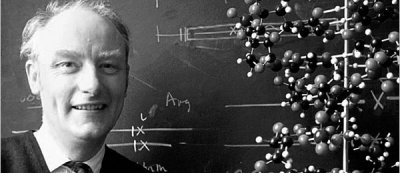
The Accomplishment:
For the few Cracked readers not versed in the history of human genetics, Francis Crick is the closest that field gets to a rock star, which is pretty fucking close as it turns out. In 1953 in Cambridge, Crick burst through the front door of his home spouting what his wife Odile originally thought was crazy jibberish about two spirals twisting in opposite directions from one another. Like all great rock star's wives, Odile was an artist, and drew exactly what her husband described. Then the pair and research partner James Watson all went out to a pub and got drunk.
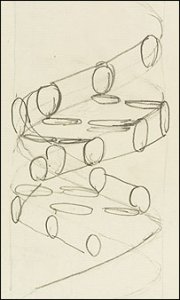
Above: Science?
Odile had no idea what they were celebrating. "Francis was always saying things like that." If so she probably should have drawn every word because those twisty spirals went on to become one of the most reproduced drawing in the history of science, a first draft of the double helix structure of DNA that scientists today still describe as "balls on."
The Drug:
LSD. Yes, when not discovering the key to life, and winning the Nobel Prize for it, Crick spent the 50s and 60s throwing all night parties famous for featuring that era's favorite party favors: LSD and nudity. Crick never made it a secret that he experimented with the drug, and in 2006, the London paper The Mail on Sunday reported that Crick had told many colleagues that he was experimenting with LSD when he figured out the double helix structure.

Drugs? This guy? No way.
Why It Makes Sense:
The double helix is essentially the Sgt. Peppers of scientific models, a ladder that's been melted and twirled by a pasta fork, or the two snakes from the caduceus if one of them was fucking the other with 100 dicks (depending on whether the artist ate the good or bad acid).
Now obviously scientists don't arrive at models by doodling on their trapper keeper and picking out the shape that looks the coolest. To do what Crick did required an insane amount of analytical, theoretical, and spatial thinking. It's not like Crick dropped out of high school and then used acid to turn himself into a supergenius.

Crick was a fan of Aldous Huxley's The Doors of Perception, a study of the human mind which was undertaken like all good studies, while driving around LA on mescaline.
Huxley wrote that the sober mind has a series of filters on it that basically prevent abstract thought (evolution put them there for the sake of survival, since having daydreams about the nature of the universe while driving can cause you to plow into a semi). But Huxley and Crick thought drugs like mescaline and LSD could temporarily remove those filters.
So rather than melting his mind into a lava lamp of trippy shapes, Crick probably used LSD to get unfiltered access to a part of his brain most normal people rarely use.

"It's so fucking beautiful."
Before You Go Trying It...
The long term effects of acid aren't so great. While Crick never officially rocked a tinfoil hat, he was known to argue that life was seeded on Earth by a race of prehistoric aliens, a theory that has yet to gain widespread acceptance among the scientific community, or really anyone who isn't a character on the X Files or L Ron Hubbard.
Freud and Cocaine Invent Psychoanalysis

The Accomplishment:
Freudian psychoanalysis is one of the most influential and controversial theories of the 20th Century. While you can argue its merits all day (though we wouldn't recommend it) you can't deny that it created an entire branch of medicine, and more importantly, gave us the two best seasons of The Sopranos.
The Drug:
Cocaine. The first ten years of Sigmund Freud's career were like a roving cocaine pep rally. He prescribed cocaine to his friends for headaches, nasal ailments or just to "give (their) cheeks a red color." After all, why whore yourself up with makeup when you can get the same effect with a little cocaine?

Actual prescription.
Freud wrote unintentionally hilarious letters to his wife promising to show her what happens to a woman in the hands of a "wild man with cocaine in his blood." Oh, and he wrote an entire book called On Cocaine that's basic thesis was: Cocaine is fucking awesome. You should really think about trying some.
After one of his friends died from the drug, Freud quietly folded up his cocaine pom-poms and sweater skirt combo, and went on to found the theory that was named after him. But a respected Freud biographer seems to think the drug played a huge role in the less embarrassing, second act of his career.
Why It Makes Sense:
In those letters to his wife bragging that he was a cocaine fueled sex machine, the man who created the talking cure said he most relied on the drug to untie his tongue. Louise Breger, who is something called a professor emeritus of Psychoanalytics Studies at the California Institute of Technology, suggests that before Freud experimented with the drug, he was an emotionally sterile, socially awkward guy in a lab coat. Cocaine not only untied his tongue, it turned him into the chatty Cathy that wanted to discuss how you felt about your mother.

"I think I'll write about cocaine again."
This shouldn't be a surprise to anyone who's been around people on the drug or at least seen the movie Boogie Nights. Cocaine bestows its takers with a preternatural enthusiasm for talking about themselves, often to the great irritation of the people around them.
Berger specifically points to a series of all night cocaine benders in which Freud and his friend Fleischel discussed their "profoundest despair," as he referred to it. From those sessions Freud came up with the whole idea of the patient pouring out his feelings on a couch while the therapist nodded and took notes.

Before You Go Trying It...
Fleischel, the friend who sent Freud on the path toward psychoanalysis was the same guy the drug ended up killing.
Dock Ellis Trips His Way to a No-Hitter

The Accomplishment:
In the hundreds of thousands of games in MLB history, there have been only 247 in which the starting pitcher records every out without giving up a hit. Pedro Martinez, like most pitchers, has gone his entire career without throwing one. In fact his team, the Mets, who've been sending a pitcher out to the mound 162 times every season for 46 years, have never had a pitcher throw one. Dock Ellis became one of the few to ever do it on June 20, 1970, though he barely remembers it.
The Drug:
Acid. The day of the no-hitter, Dock Ellis woke up around noon on what he thought was Friday and ate three tabs of acid, presumably because he was tired of Wheaties. But when his girlfriend arrived she was carrying Saturday's newspaper, which meant he'd slept through Friday or that his girlfriend's was a time traveler. The sports page had more bad news, he was scheduled to pitch in San Diego in six hours. Not only was the day that was beginning to swim around him the wrong one, the city his day was swimming in was Los Angeles.
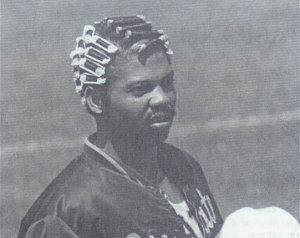
"Not one thing about today makes sense to me."
We probably wouldn't have gone to the ball park that day (not to mention slept through a Friday and eaten LSD for breakfast). But Ellis had pitched high before. And by that we mean he had never pitched sober. Starting with booze as a high school prodigy and moving up through amphetamines and cocaine in the MLB, his Pirate teammates often took bets on whether anyone could take as many amphetamines as Dock.
Unfazed despite being on enough acid to melt Jimi Hendrix's guitar, Ellis hopped a flight to San Diego, and faced down a lineup that had woken up knowing what day it was, and also had the upper hand in the "not on acid" category. Not a single one got a hit.

Ellis remembers very little about the game, other than that sometimes the ball was huge in his hands and sometimes it was tiny, and that at one point he dove out of the way of a line drive, only to look up and see that the ball hadn't even reached the mound. If this sounds like a ridiculous cartoon to you, that's probably what it looked like to Ellis. So how the fuck did Ellis manage to pitch a better game than Pedro Martinez ever would?
Why It Makes Sense:
Writing in the New Yorker, Oliver Sacks describes a state of mind known as "the zone" in which "A baseball ... approaching at close to a hundred miles per hours ... may seem to be almost immobile in the air, its very seams strikingly visible... in a suddenly enlarged and spacious timescape." The zone is typically brought on by confidence, adrenaline and being fucking awesome at baseball. Ellis was all of those things, and LSD's affects include increased heart rate and the slowing down of time. So it's conceivable that Ellis tripped his way into the zone.
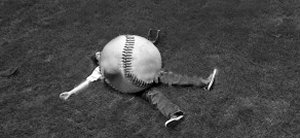
What Ellis saw the day of his no-hitter.
A large part of throwing a no hitter is getting over the fact that you're throwing one. As the game goes on and the lonely bastard in the middle of the diamond gets closer to immortality, the tension in the park and in the pitcher builds. Trying to throw a no hitter is such a mind fuck that it's considered the height of dickery for a teammate to acknowledge the no-hitter until the final out is recorded.
But baseball history was the last thing on Ellis' mind, keeping his shit together while a bunch of giant lizards fucked in the on-deck circle being the first.

Before You Go Trying It...
Ellis had the career trajectory of Darryl Strawberry, never reaching his potential because of drug addiction. Instead of being a household name, Dock Ellis is just that guy who threw a no-hitter on acid.
A Coke Addict Makes a Coke-Flavored Cola and Calls it Coke

The Accomplishment:
The invention of Coca-Cola might not seem to belong on a list next to things like DNA. After all, way more people drink Coke than have heard of the double helix.
Coca-Cola is simply the most well known brand in the history of the world. Sure, it's mostly just soda water and sugar. But they sell about 400 billion cans of the stuff a year to about 200 countries, an average of more than 60 cans to every single human being on the planet.
Pretty impressive for a drink that routinely gets beat in taste tests by Pepsi.
The Drug:
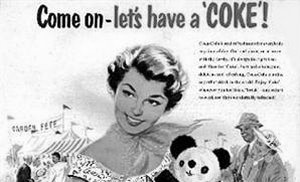
Coke has it right there in the name. When Coca Cola was created in the summer of 1885, the market was even more crowded with sodas than it is today. In addition to Coke, Pharmacists were selling thousands of sodas, including Dr. Pepper, which got its name from the Texas doctor who marketed it as a cure for impotence. The belief that effervescent water contained health benefits goes back to the Romans, and given the state of mainstream medicine in the 1890s, customers were more than happy to believe Dr. Pepper got your dick up just as well as an old fashioned leech bleeding. Coca Cola was able to stand out in the crowded market because it's purported health benefits weren't total and utter bullshit.
 John Pemberton, the Atlanta pharmacist that invented Coca Cola, claimed that the ingredient it was named after, the Coca leaf, cured everything from depression and nervousness to morphine addiction. If those purported effects sound familiar, congratulations, you could beat a chimpanzee in a game of memory. Coca is the leaf that produces cocaine, and like Freud, John Pemberton was incredibly enthusiastic about its "health benefits."
John Pemberton, the Atlanta pharmacist that invented Coca Cola, claimed that the ingredient it was named after, the Coca leaf, cured everything from depression and nervousness to morphine addiction. If those purported effects sound familiar, congratulations, you could beat a chimpanzee in a game of memory. Coca is the leaf that produces cocaine, and like Freud, John Pemberton was incredibly enthusiastic about its "health benefits."
But surely he wouldn't go so far as to stake the claim of his fledgling business on an unproven drug, right?
Why It Makes Sense:
Like Freud, Pemberton practiced what he preached. In fact, when he said he was convinced from "actual experiments that coca is the very best substitute for opium addicts," he was speaking from personal experience, since he was a himself a morphine addict. But whereas Freud retired his cocaine megaphone once doctors sounded the "shit kills you" alarm, Pemberton chose to put it in his soda, plug his ears, and hum loudly.
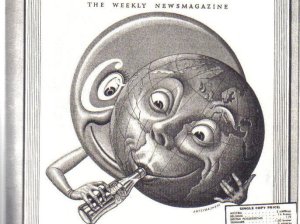
In his history of the beverage, Mark Pendergrast claims there was about 8.45 milligrams of cocaine in each serving, which is about 1/4th of what people put up their nose to get high these days. But fans of the drink were known to chug up to five at a sitting, or to drink it with five times the syrup called for in the recipe. When combined with the sugar and caffeine, that brings the drug to right around street level.
So it's not surprising that by the time cocaine was removed from the drink in the early 20th century, people were ordering Cokes by asking for "a dope."
Before You Go Trying It...
If that story makes you think cocaine is cool, you should check out the Russell Crowe smoking commercial The Insider.
Moses Takes 'Shrooms, Shits Out Ten Commandments

The Accomplishment:
There's plenty of controversy surrounding certain parts of the Bible, (where are the dinosaurs?), but most can agree that the Ten Commandments make some good points: killing is wrong, stealing is wrong, and weekends are for sleeping.
When the whole world was presumably murdering whoever they wanted and coveting the shit out of anything that crossed their paths, Moses was the one who God deemed suitable enough to pass his commandments onto. So, one day in... Biblical times, an audience gathered and politely waited while Moses met with God on the top of Mount Sinai to discuss the rules that we still use today, (or are, at the very least, aware of).

The Drug:
Mushrooms.
Drugs weren't invented yesterday, you know. In fact, they grow right up out of the ground, all on their own. The area surrounding Mt Sinai, for example, was home to two common psychedelic drugs and, according to a 2008 Time and Mind article written by Benny Shanon, a professor at Jerusalem's Hebrew University, psychedelic mushrooms and other mind-altering substances played a huge role in the religious rites of Israelites during Biblical times.

While it would be irresponsible of us to assume Moses was drugged up based solely on the fact that drugs were both acceptable and available at the time, Professor Shanon maintains that the scene described in Exodus, (involving blaring trumpets, bright lighting and thunder), fits the "classic imaginings of people on drugs" and further that "the seeing of light is accompanied by profound religious and spiritual feelings."
Why It Makes Sense:
The evidence isn't completely conclusive, but a closer look at our choices leads to a fairly obvious answer. Either:
1. God visited Moses and decided that he was the perfect spokesman for his commandments, (despite Moses's total lack of previous experience in the supernatural-commandment-liaison department), and all of Moses's friends and family believed him when he said "God spoke to me" and instantly stopped coveting shit.
Or
2. A group of extremely bored Israelites ate a bunch of easily-accessible mushrooms and imagined a bunch of crazy shit.

"Is anybody else freaking out a little bit?"
It was thousands of years ago. No Internet, no TV. There wasn't much to do other than eat plants, particularly when those plants led to conversations with God. It doesn't take a college professor to figure this one out, (although, technically, it did this time).
Still, this is a pretty huge deal. Everyone wants to say how dangerous it is to use psychedelic drugs, but Moses takes a few and comes up with a set of morally sound rules that have held up for thousands of years and, for some, serves as a reason not to murder the guy in front of you who's taking an annoyingly long time at the ATM.
Before You Go Trying It...
There's a really good chance that eating random mushrooms you find on the ground will kill your ass.
Also, we don't think we're speaking out of turn here when we point out how sloppy and half-assed the Ten Commandments are. If you're going to create a system of unchangeable rules meant to govern large groups of people, you might want to think "manual" instead of a "grocery list."

"We should be good with just this, right guys?"
Something with a FAQ page at least. "What about murdering in self defense? And what if your neighbor's wife is really hot? Do two Commandments cancel each other out? Can I murder my hot neighbor's stupid husband?"
Like most stoners (take for instance the ones in Pineapple Express, a movie you should totally see), Moses was probably too lazy to do all that extra work so he just sort of summarized, but the rest of us can agree that it would've been nice to have those answers.
To find out which of these stories involved the shameless screwing of an ingenious female scientist, read Four Great Women Buried By Their Own Boobs only in the new Cracked.com book.